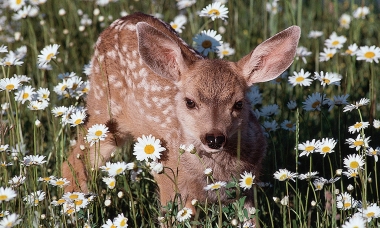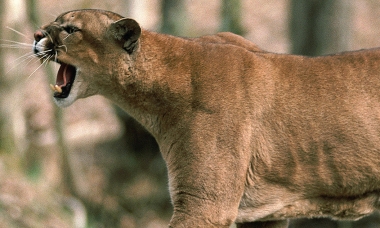
What does ODFW do when a cougar creates a public safety issue?
Most of our work involves advising landowners and others on how to avoid cougar problems.
Feeding pets inside, sheltering pets and livestock indoors at night, fencing, keeping your dog on a leash when outdoors, and other simple steps can limit conflicts. (See more tips in our Oregon is Cougar Country brochure.) Cougar problems often resolve themselves with no further action by ODFW.
But sometimes when a cougar displays dangerous behaviors, ODFW or partners like law enforcement and USDA Wildlife Services may try to humanely kill the cougar to avoid a more serious problem such as an attack.
When a situation occurs in town, law enforcement is often involved because they can legally discharge a firearm within city limits.
Oregon law does not prohibit landowners or people legally occupying the land from killing a cougar posing a public safety risk, and no permit is required*. However, there are laws against discharging a firearm within city limits and in other areas so it is best to involve ODFW or law enforcement in these areas.
(*Per Oregon statute 498.012)
Why can’t you just relocate the cougar?
- Relocating a cougar simply moves the problem to a new area, potentially putting other communities at risk. Once a cougar has learned to navigate the human environment, it often returns to the same or a similar place where its dangerous behavior continues.
- Cougars are extremely territorial, especially males, and have large home ranges. Moving a cougar into another one’s area causes conflict with cougars already in this habitat so it’s usually not a good outcome for the animal. Relocating wildlife also risks spreading disease.
- Oregon has a robust cougar population, so there isn’t good, unoccupied habitat left to relocate problem cougars.
Can’t the cougar be put in a zoo?
Zoos or other captive facilities are not good fits for older cougars removed from the wild. ODFW and other wildlife professionals consider it inhumane to place an adult wild cougar used to ranging over 100 miles into an enclosure for the rest of its life. Adult wild cougars placed in captivity often exhibit signs of extreme stress and make poor candidates for exhibit or education.
ODFW and our zoo placement partners try to place healthy cougar kittens into zoos or other facilities accredited by the Association of Zoos and Aquariums (AZA). Kitten placement at these facilities can be limited to available space and most successful placements are with orphaned kittens less than three months old with little experience living in the wild.
AZA accredited facilities meet high standards for both animal care and safety to protect people and wildlife.
Cougar biology
Historically, cougars had the broadest distribution of any mammal in the Western Hemisphere. In Oregon’s early history, cougars were abundant or common throughout most of the forested parts of the state.
Today, cougars are once again widely distributed throughout Oregon. The best habitat and highest densities of cougars are found in forested areas, canyons and rugged mountainous terrain in northeast and southwest Oregon. Deer are their primary prey followed by elk, but they will also prey on raccoons, bighorn sheep, other mammals and birds.
Cougars currently occupy most of the available cougar habitat in the state and are expanding into lower quality habitats that include human habitation. At the same time, urban areas are expanding into cougar habitat due to population growth and development.
Cougars can reproduce throughout the year, though most births occur during the warmer months from May through October. Gestation periods are about 90 days with females producing an average of two to three kittens per litter. Typically, females breed for the first time at 17 to 24 months.
While cougars are solitary animals, offspring will remain with their mother for several months before becoming independent at 9 to 21 months of age and dispersing for new territory. (When you see images of several cougars together, it is a mother and her offspring.) Male cougars disperse at higher rates and farther distances than females.
For management purposes, Oregon is divided into six cougar management zones that were drawn to include similar habitats, human demographics, land use patterns, prey base and cougar density. See map of cougar zones.
Identifying cougars and tracks
Coyotes, bobcats, large house cats and dogs are often mistaken for cougars. You can tell it’s a cougar by its:
- Large size, adult cougars weigh 80 pounds (females) to 140 pound (males)—making them much larger than bobcats or coyotes.
- Cat-like appearance.
- Even tan or tawny body color.
- Long tail. An adult cougar's tail is nearly three feet long and a third to a half of its total length.
Cougar track
- Doesn't include claw marks because cougars have retractable claws.
- Has three distinct lobes at the base of the heel pad, forming an “M” shape.
Dog track
- Includes claw marks.
- Rear pad is more rounded.
Cougar Management Plan and statutes
Cougar management in Oregon is guided by the Cougar Management Plan, last updated in 2017.
Cougars may be hunted statewide year-round by hunters with a valid hunting tag until the zone’s quota is reached. However, a statewide ballot measure passed in the mid-1990s made it illegal to hunt cougars with dogs. More about ballot measure.
ODFW, law enforcement and certified agents may use dogs or bait for official management actions such as responding to livestock damage and public safety issues.
Over the years, the Oregon State Legislature has adopted the following cougar management statutes. ODFW management policies are based on these statutes.
For livestock damage and public safety (ORS 498.012)
Taking wildlife causing damage, posing public health risk or that is public nuisance. (1) Nothing in the wildlife laws is intended to prevent any person from taking any wildlife that is causing damage, is a public nuisance or poses a public health risk on land that the person owns or lawfully occupies…(2)(a) Nothing in subsection (1) of this section requires a permit for the taking of cougar, bobcat, red fox or bear pursuant to that subsection. However, any person who takes a cougar, bobcat, red fox or bear must have in possession written authority therefor from the landowner or lawful occupant of the land that complies with subsection (4) of this section. (See statute)
Defining what behavior is a public safety issue (ORS 498.166)
Bears or cougars posing threat to human safety. (1) Notwithstanding the licensing and tag requirements, a person may take a cougar or bear that poses a threat to human safety…
b) “Threat to human safety” means the exhibition by a cougar or bear of one or more of the following behaviors:
(A) Aggressive actions directed toward a person or persons, including but not limited to charging, false charging, growling, teeth popping and snarling.
(B) Breaking into, or attempting to break into, a residence.
(C) Attacking a pet or domestic animal as defined in ORS 167.310.
(D) Loss of wariness of humans, displayed through repeated sightings of the animal during the day near a permanent structure, permanent corral or mobile dwelling used by humans at an agricultural, timber management, ranching or construction site.
Statute against feeding bear, cougar, coyote and wolves (ORS 496.731)
Written notification requiring removal of attractant for potentially habituated wildlife; exceptions. (1) As used in this section: (a) “Officer” means any person authorized to enforce the wildlife laws pursuant to ORS 496.605, 496.610 or 496.615. (b) “Potentially habituated wildlife” means bear, cougar, coyote and wolf. (2) A person who places, deposits, distributes, stores or scatters food, garbage or any other attractant so as to knowingly constitute a lure, attraction or enticement for potentially habituated wildlife may be issued a written notification by an officer requiring the person to remove the food, garbage or other attractant within two days of notification. (3) A person who receives a written notification under subsection (2) of this section shall remove the food, garbage or other attractant as directed.
Statute against removing animals from the wild or holding them in captivity (ORS 497.308)
Wildlife holding and habitat removal permits
No person shall remove from its natural habitat or acquire and hold in captivity any live wildlife in violation of the wildlife laws or of any rule promulgated pursuant thereto.






